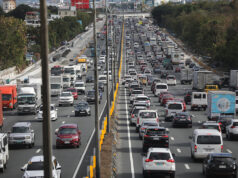Transport groups seek ‘surge’ charge on fares during rush hour

By Arjay L. Balinbin, Senior Reporter
JEEPNEY and bus operators want to impose a “surge” charge on top of base fares during rush hour, amid worsening traffic conditions and rising oil prices in Metro Manila.
The Land Transportation Franchising and Regulatory Board (LTFRB) on Tuesday said it had received a petition from three transport groups that seek to charge commuters an additional P1-P2 during peak hours of 5-8 a.m. and 4-8 p.m., Monday to Saturday due to the spike in pump prices.
Pasang Masda, Alliance of Transport Operators and Drivers Association of the Philippines (ALTODAP) and Alliance of Concerned Transport Organization (ACTO) filed the petition before the LTFRB on Oct. 14.
Traditional and modern jeepneys want to impose an additional P1 on top of the current minimum fare during peak hours, while buses are seeking additional P2.
Based on the petition, the additional charge will not be collected on Sundays and national holidays.
As of Oct. 11, the year-to-date increases in per-liter prices for gasoline and diesel are P15.65 and P35.80, respectively, according to the Energy department.
Traditional and modern jeepneys recently raised the minimum fare to P12 and P14.
However, the transport groups said this “would not be enough to alleviate” the losses incurred by jeepney operators and drivers.
They said a traditional jeepney driver’s gross income averages P1,800 from the Tayuman-Pritil route in Manila, which includes a boundary charge of P450 and P1,000 for about 15 liters of diesel.
“This would result in a driver’s take-home pay of P350, which is only P61.4% of the P570 minimum wage in the National Capital Region,” the transport groups said.
Some modern jeepney units incur a net loss of P478.90 a day, the groups noted, adding that this makes their operation “not sustainable.”
“Allowing a surge price of P1 on top of the base fare of P14 for [modern jeepneys] during rush hours at an average of 230 passengers per day can increase the daily gross income of a Parang to Cubao modern jeepney to P9,670, yielding a negative daily net income of P248,” they said. “This is still operation at a loss, but not as worse as negative P478.90 per day.”
For city buses, the groups said allowing a surge price of P2 on top of the P15 base fare for an air-conditioned one and the P13 base fare for an ordinary one during rush hours would “be a big help” to stay operational.
Public buses experience the same difficulties as traditional and modern jeepneys during rush hours, the groups noted.
“This surcharge is the remedy that can most expediently give help to public utility vehicle operators and drivers,” they said.
The LTFRB said that while it recognizes the plight of drivers and operators, it also understands commuters’ concerns that another fare increase will burden them even more.
It also cited the inflationary effect of fare hikes.
Transport expert Rene S. Santiago said the transport groups’ petition is reasonable due to the recent oil price hikes.
“The recent fare adjustment was too low relative to diesel price movements. Imposing higher charges during peak hours is valid, but messy to implement on a per kilometer basis. A fixed surcharge of P3-5 is simpler,” he said in a mobile phone message.



